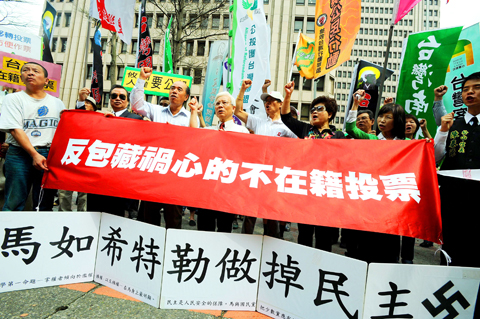|
Alliance protests absentee voting plan
RIGHT TO VOTE: Activists voiced concern that allowing
Taiwanese in China to vote might compromise the system as they would be under
the watch of Chinese officials
By Loa Iok-sin
STAFF REPORTER
Saturday, Mar 06, 2010, Page 3

Members of the Alliance for Fair Elections
hold up a sign that reads “Ma is killing democracy just as Hitler did” during a
protest yesterday morning outside the Ministry of the Interior against plans to
allow absentee voting.
PHOTO: WANG YI-SUNG, TAIPEI TIMES
The Alliance for Fair Elections — a coalition of several independence groups —
staged a protest yesterday morning against plans to allow absentee voting,
calling it a tool for manipulating elections.
Dozens of people mobilized by the alliance chanted “Absentee voting is an evil
plot” and “No to absentee voting for Taiwanese businesspeople [in China]” as
they protested outside the Ministry of the Interior.
Minister of the Interior Jiang Yi-huah (江宜樺) announced plans to allow absentee
voting at a press conference last month.
Jiang said at the time that absentee voting would protect citizens’ right to
vote. He said that in the initial stage, absentee voting would only apply within
Taiwan, meaning voters who cannot make it back to their hometown can cast their
votes at designated polling stations near where they reside.
“The ministry is pushing for absentee voting so that they can manipulate
election results,” said Chang Yeh-shen (張葉森), a member of the alliance and
chairman of the Taiwan Hakka Society. “If the ministry really cares about making
it more convenient for voters, it should try to move elections to Sundays and
extend voting hours.”
Elections are currently held on Saturdays from 8am to 4pm.
“The absentee voting plan is an evil plot,” Chang said.
Another alliance member, Tsay Ting-kuei (蔡丁貴), said that President Ma Ying-jeou‘s
(馬英九) administration was pushing for absentee voting because it wanted votes
from hundreds of thousands of Taiwanese living in China.
Tsay, who is also the convener of the Alliance of Referendum for Taiwan,
expressed concern that those living in China might not be able to exercise their
right to vote freely.
“We’re also worried that phantom voters may find a loophole to sneak into the
system if absentee voting is in place,” Tsay said.
A Taiwanese businessman who runs a factory in China voiced the same concern.
“Although absentee voting would safeguard our right to vote, it may not be such
a good idea, more so because a large number of Taiwanese are living in China,
and they would be under the watch of Chinese officials if they cast their vote,”
said the businessmen who wished to be known only by his surname Chang (張).
He said that in 2004, a banquet to mobilize support for then-Chinese
Nationalist Party (KMT) presidential candidate Lien Chan (連戰) took place in the
city in China where he lives.
“All Taiwanese businesspeople were invited, and local officials ‘hinted’ that we
should attend,” Chang told the Taipei Times by telephone. “So everyone went —
including those who supported the Democratic Progressive Party candidate.”
Chang said Chinese officials would undoubtedly make the same “hint” if Taiwanese
were allowed to vote in China.
“You know, back in 2004, a local official [in China] actually asked me to bring
the stub of the ballot to him if I voted in the presidential election, and I
just told him we don’t have any stub attached to the ballot,” Chang said,
laughing.
In response to the protest, Deputy Minister of the Interior Chien Tai-lang
(簡太郎) said in a separate setting that the ministry had no plans to allow voters
abroad to take part in the proposed absentee voting.
|
![]()
![]()
![]()